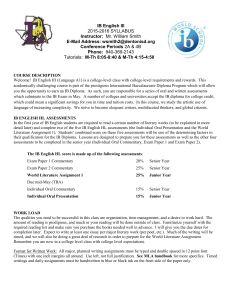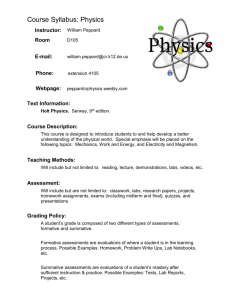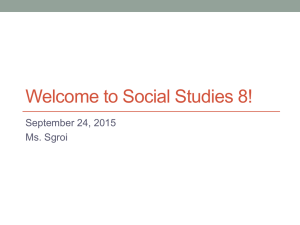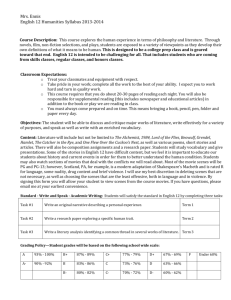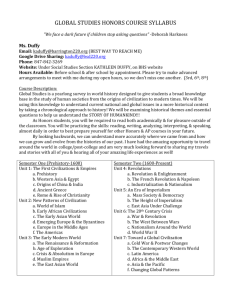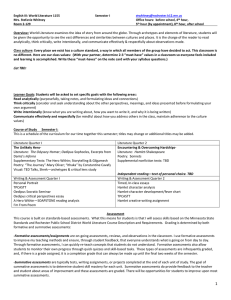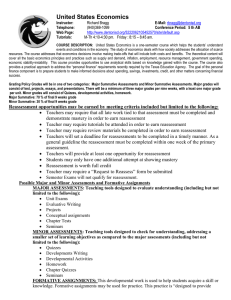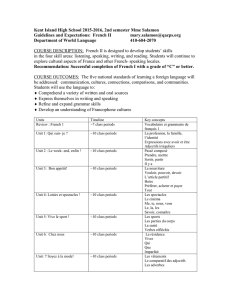Current Event Essay Sample - Denton Independent School District
advertisement
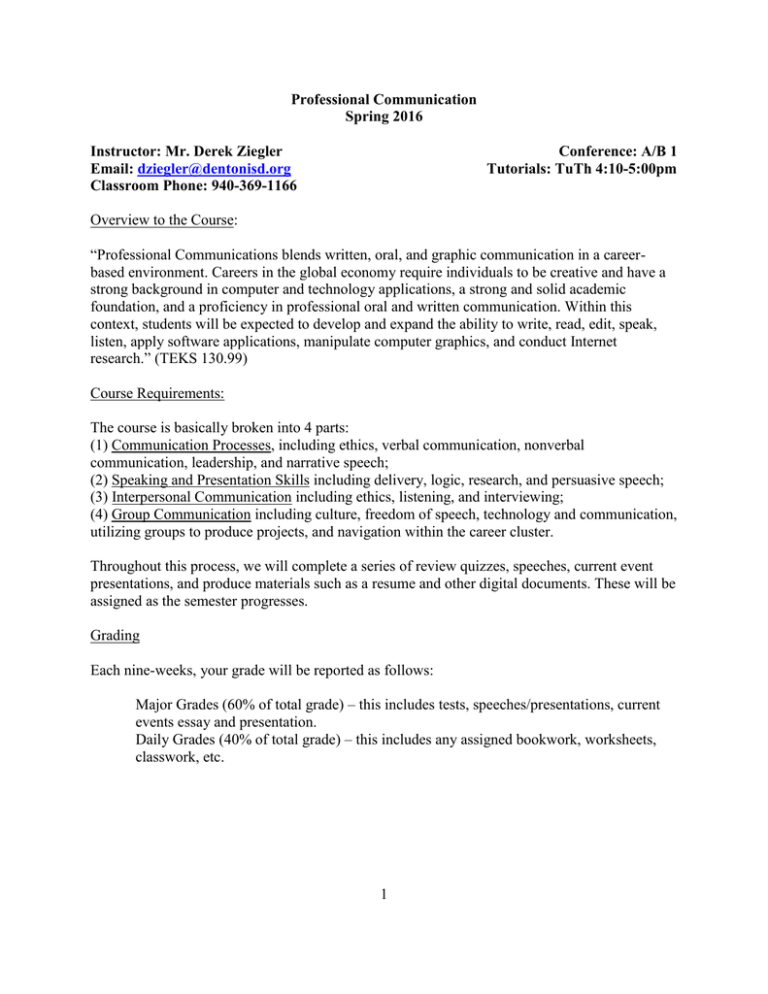
Professional Communication Spring 2016 Instructor: Mr. Derek Ziegler Email: dziegler@dentonisd.org Classroom Phone: 940-369-1166 Conference: A/B 1 Tutorials: TuTh 4:10-5:00pm Overview to the Course: “Professional Communications blends written, oral, and graphic communication in a careerbased environment. Careers in the global economy require individuals to be creative and have a strong background in computer and technology applications, a strong and solid academic foundation, and a proficiency in professional oral and written communication. Within this context, students will be expected to develop and expand the ability to write, read, edit, speak, listen, apply software applications, manipulate computer graphics, and conduct Internet research.” (TEKS 130.99) Course Requirements: The course is basically broken into 4 parts: (1) Communication Processes, including ethics, verbal communication, nonverbal communication, leadership, and narrative speech; (2) Speaking and Presentation Skills including delivery, logic, research, and persuasive speech; (3) Interpersonal Communication including ethics, listening, and interviewing; (4) Group Communication including culture, freedom of speech, technology and communication, utilizing groups to produce projects, and navigation within the career cluster. Throughout this process, we will complete a series of review quizzes, speeches, current event presentations, and produce materials such as a resume and other digital documents. These will be assigned as the semester progresses. Grading Each nine-weeks, your grade will be reported as follows: Major Grades (60% of total grade) – this includes tests, speeches/presentations, current events essay and presentation. Daily Grades (40% of total grade) – this includes any assigned bookwork, worksheets, classwork, etc. 1 Academic Integrity: Academic honesty is an absolute necessity if you are to learn all that you can. Cheating, copying another’s work, or having someone else do the work for you are actions which call for the most severe academic and personal consequences. Never resort to dishonesty in order to make a deadline. I will follow the Academic Integrity Policy of the district, included in the student handbook. Cheating includes such acts as: copying during a test, sharing answers or test questions with other students, copying information on any assignment in which an individual grade is given, or plagiarizing. Cheating of any sort will not be tolerated in this class. Course Policies: You will succeed in this course if you follow five simple rules – (1) Be Respectful – respect everyone in the room. No derogatory language towards anyone. (2) Be Prepared – make sure you’ve completed any assignments for the day. (3) Be Punctual – arrive on time every day and notify me about project absences or tardiness. (4) Be Engaging – express ideas, ask questions, and pursue clarification. (5) Do Not Be Disruptive – use laptops, phones, tablets, etc., only when expressly told that you can. Do not interrupt others – learning requires focus. Required Materials: One 3-5 subject spiral book (perforated) or a folder/notebook with paper. This will be used to keep assignments we’re working on and keep notes. Print this syllabus and place it in your notebook! Readings: They will be occasionally assigned. Readings must be completed and students should be prepared to discuss them when they come into class on the day discussion is assigned. 2 Current Events Guidelines: Knowledge of current events and the ability to discuss what is going on in the world not only make you a more informed citizen but also better at communicating with people on a daily one-to-one basis. Often, we develop our opinions through discussion of complicated events, and you are at a time in your life when you will begin defining your own beliefs and attitudes in a global context. We will have current event assignments due throughout the semester. This is a guide for how to complete that assignment. This ongoing project is simple if you follow these steps. Step 1: Use the Internet to select a current event article. Your article can be from any news site you choose, but the news piece must be of “global significance.” That means it has to be important to a large number of people. Use your common sense here. Step 2: Print your article. Please try to conserve paper by selecting the “print” option from the website to eliminate advertisements. Print on both sides (duplex), and avoid printing in color. Step 3: Write a 1-page essay. Essays should be limited to critique—not summary. I am interested in what you think about what happened. Any material that summarizes the event will not count toward the total length. TIP: Write in proper English sentences and paragraphs. Avoid abbreviations. Special Note: The excuse that a printer or computer was either unavailable or not functional will not be accepted. Computers and printers are available in your local public library, in the school library, and in every teacher classroom on campus. You may also email your essay & a link to your article to me, and I will happily print them for you. Articles/essays may not be printed in class on their due date after roll is called. 3 Current Event Essay Sample Please Read! Your Name Speech, Period Month Day, Year Insert a Centered Title Here (optional; no bold, italics, or underlining) Begin typing here. You may follow this format exactly. Please keep this sample and syllabus handy throughout the semester. Your entry must be typed. There will be no excuse accepted for turning in an entry that is not typed. Public libraries and the school library are open for your use, and printers are readily available. You may start the document heading in single spacing, but switch to double spacing immediately after the entry of the date in the heading. Use 12-point Times New Roman font and standard margins on all borders of the page (1”-1 ¼”). Points may be deducted if margins or fonts are changed to accommodate more or less written work. Retrieve your article from a credible online news source that is easily accessible by school computers. Be sure that the content for your event is appropriate for the classroom. Examples of acceptable news sites include CNN.com, MSNBC.com, Yahoo.com, Economist.com, nytimes.com, and others. Remember—you cannot provide an incorrect answer. All work performed should be original, and you will be graded for completion as well as your ability to follow these simple formatting requirements. I will take off points if your essay is too short, but I am primarily looking to see a welldeveloped paragraph stating your opinion based on your reading. There is virtually no reason you should be unable to perform well on this assignment. The bottom line—the average grade if completed is very high. 4 Denton ISD’s Standards-Based Grading Policy: Denton ISD recently adopted a standards-based grading policy. Grades will be determined based on a student’s mastery of course standards. Only major and minor summative assessments will be considered in determining a student’s grade. Summative assessments assess how well a student has mastered the objectives. They are designed to provide information to be used in making judgments about a student’s achievement at the end of a sequence of instruction. Major summative assessments are designed to evaluate understanding. They take place at the end of a learning unit, incorporating what has previously been tested in the unit’s minor assessments. Examples: Critical Reading of a Text, Response to Literature, Writing, Revising and Editing, etc. Minor summative assessments are designed to check for understanding, addressing a smaller set of learning objectives. Examples: Quizzes, Discussion of Literature, Writing Revisions, etc. Formative assessments will be given continually. They are practice so that the student and teacher can gage the success of the student. They are designed to provide direction for improvement and/or adjustment of teaching and learning activities for individual students or for a whole class. Examples: teacher observation, class discussion, practice, homework, instructional questions, initial drafts/attempts, independent practice, daily work, quizzes Reassessment is for students who have not shown mastery on any major or minor summative assessment. A student may opt to retake assessments one time, and only after he or she has demonstrated new learning to justify a reassessment. This demonstration of learning is determined by the teacher. In addition, all formative work and/ minor work must be completed before a student is allowed to reassess. As a general guideline, reassessment must be completed within one week after the primary assessment has been graded and returned. Reassessments are worth full credit. Non-Academic Work/Behaviors Work or behaviors that are not supported by the standards are considered non-academic. There have been many misunderstandings regarding what this means for students at Guyer. Students 5 will still have homework. Students will still have due dates and deadlines. Actions that impede the learning process such as not completing assignments, not participating in class, chronically turning in late work, etc. may be met with disciplinary measures that include, but are not limited to: detention Saturday School ISSC loss of parking permit loss of dismissal period Additional Notes: This syllabus is not a contract and may change throughout the semester. 6
